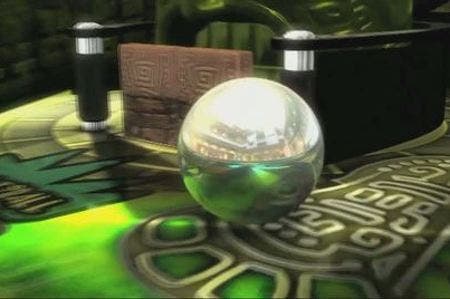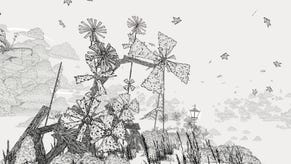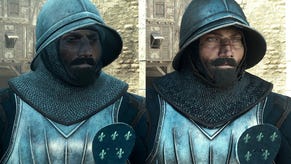The Story Behind XBLA's Biggest Game
How Pinball FX 2 took over XBLA.
When Microsoft released its chart of the best-selling Xbox Live Arcade titles of 2011, the occupant of the top slot may have raised a few eyebrows. Rather than a critically acclaimed and widely discussed hit such as Bastion or From Dust, the number one game of the year was a pinball game. A pinball game from 2010, no less.
That Pinball FX 2 managed to top the charts is down to a superb core game - earning a 9/10 here on Eurogamer - but also a canny approach to DLC. Hungarian developer Zen Studios has added new tables at a steady clip, including a hugely successful series based on Marvel's superheroes. There are now over 25 tables available for the game, covering everything from the early wood-and-springs design of Rocky and Bullwinkle, through the 1980s style of Street Fighter to hugely advanced modern tables, loaded with features and animations.
Yet for all the clatter and noise emanating from the game itself, in publishing terms it's been a quiet sort of victory, arriving with little fanfare, and achieved without aggressive promotion. Here, Neil Sorens, Creative Director of Zen Studios, and Mel Kirk, the Vice President of Marketing and PR, talk about the origins and evolution of Pinball FX, the future of digital distribution and the security of steady sales.
Although it can be tempting to get caught up in sales figures and press coverage, it really doesn't matter in the end if we sold more or fewer copies than other games. What does matter is that we sold enough to keep doing what we love to do. Because the game has sold well, we've been able to staff additional table-creating teams and to raise the production values of our new tables.
The comparison to other games is a little bit unfair to them. Each of our tables, which takes a team of four or more about eight months to finish, is essentially a game in itself. We have over 25 of these games inside Pinball FX 2, so a comparison to a standalone game is apples and oranges.
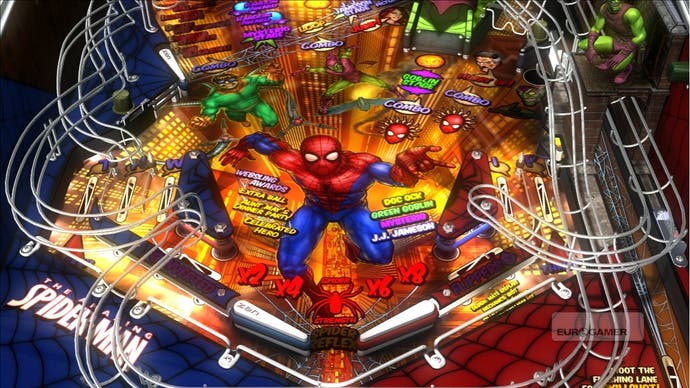
There were two big reasons we got into making pinball games. The first is that we already had people at the company who were passionate about pinball. The second is that there weren't a lot of other people making pinball sims any more. For a service like Xbox Live Arcade, and for digital distribution generally, a pinball game priced for impulse buys made perfect sense.
Mobile and handheld platforms are just now getting to the point where we can do most of what we want in terms of physics. There are still some trade-offs we have to make. On consoles and modern PCs, though, it's pretty much a solved problem. The stuff we do in the future is going to be more about content and new ways to enjoy that content.
We'll be doing a sequel at some point in the future, not this year, because there's no way we can do everything we want to with game updates. We definitely want to use the same business model as FX 2, though: free platform download, free import of content you've already purchased.
The main rule is that we have to stay faithful to a sim-style table layout and gameplay style. It has to look and play like a real machine, though of course we do add some visual fluff that would be either impossible or incredibly expensive to reproduce in real life.
Once we've decided on a table theme, we start the whole process by analysing the table's theme to isolate the characteristics that we want to incorporate into the table. Then we do a mock layout of the table, showing major table features and describing the primary modes and objectives.
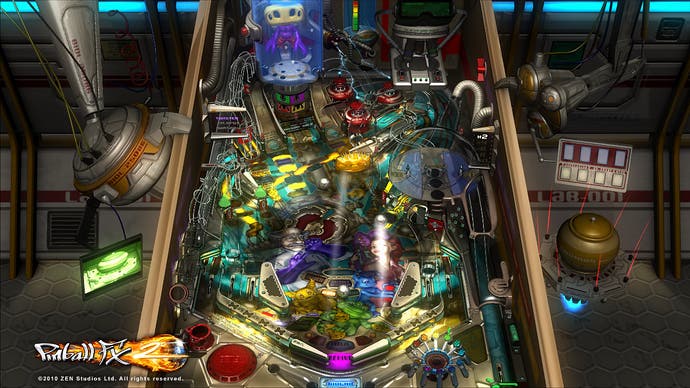
After that, we do a full game design document. Once that is complete, we can get to work on the table geometry and scripting the table logic. Then comes texturing, iteration on the design, motion capture and animation for any 3D models, and sound and music production. At the same time, we're writing the voiceovers and text, creating animations for the dot matrix display, implementing Operators Menu functionality, and what feels like dozens of other tasks. Once we have some table logic in place, we start testing as well.
Throughout the process, if we're working with a licensed property, we're sending documents, art, table builds, etc. to the licensor for their stamp of approval. And with Marvel, they're also sending us their ideas for consideration, which has been a big help in getting the authenticity and character of the tables just right.
We have had a long-standing relationship with Marvel, dating back to a game we did based on The Punisher. Both Marvel and Zen really enjoyed working together during that project and we decided to keep it going. Pinball FX and Zen Pinball were both doing very well, and we were starting to bring other brands to the game. It didn't take a stroke of genius at that point to figure out that we should be working together on pinball.
As with any major property, there are a few restrictions on which characters (and which versions of characters) we can use, but nothing that impedes creativity or quality. Marvel is actually always trying to get us to put more characters and such on the tables, rather than telling us we can't use them.
We don't have a strict definition of what crosses the line, but like the famous line about obscenity, we know it when we see it. Almost all of the impossible stuff is purely visual, although we do play a little bit with friction in few different modes, like the Fastball Special on Wolverine and Adhesive X on Captain America.
We should have been more diplomatic, certainly, but regret at getting involved? No. The perception that Microsoft was a big, bad indie-exploiting monster was really starting to snowball - not among industry types, most of whom knew better, but among the plugged-in gamers who drive public opinion in online communities.
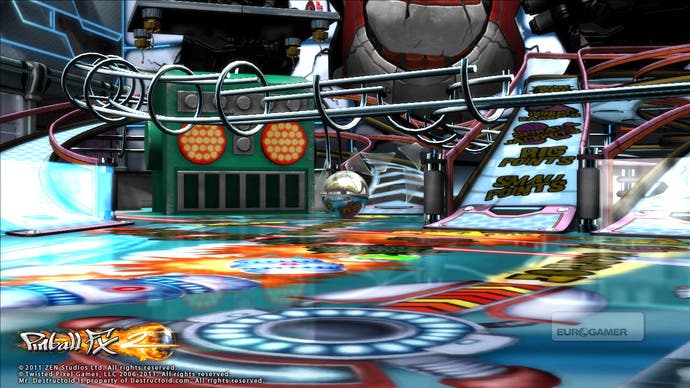
And here's the thing: that's not a problem just for Microsoft. At some point, Microsoft says, 'You know, publishing indie games just isn't worth the PR hit we're taking. We're not going to do it anymore. They can go through 3rd party publishers instead.' And that hurts indie developers across the board, because third party publishers aren't willing to take the same risks on cool but unproven ideas.
Are there changes we'd like to see? Yes. Game updates are too costly, for example, and the new dashboard has reduced visibility for XBLA titles, which rely heavily on visibility and impulse purchases for success. We'd also like to see Microsoft take a more open stance towards user-created content. And the ability to self-publish would be nice. But on the whole, we're very happy with how Microsoft has managed the service.
Simply put, the digital market is chaos. The market is changing so fast, it's difficult to predict what will be happening six months from now, and to look beyond that is literally impossible. Steam, XBLA, PSN, eShop, iOS, Android, OnLive, Facebook - there is no shortage of outlets for a digital game, but each one has its advantages and disadvantages: the size and tastes of the user base, the amount of visibility your game will get, the price at which you can sell your game, the suitability of the hardware for your game, the difficulty of development (and on closed platforms, approval), and so on.
Because our solution to this chaos is a 'shotgun' approach, exclusively self-publishing on relatively open platforms such as PC is not going to be sufficient for us. Pinball is still kind of a niche game, so we need to be in as many places as possible to reach potential customers. Plus, we've gone to the trouble of building relationships with first parties and getting familiar with all the hoops we have to jump through, so the disadvantages of console/handheld publishing aren't so onerous for us as they might be for a first-time developer.
Boxed products probably aren't worth the cost and effort for us, except in cases where we could, without cutting into our digital sales, reach a new audience that doesn't have access to or isn't aware of our digital offerings. So, maybe a PC product in Walmart next to the deer hunting games - we'll see.
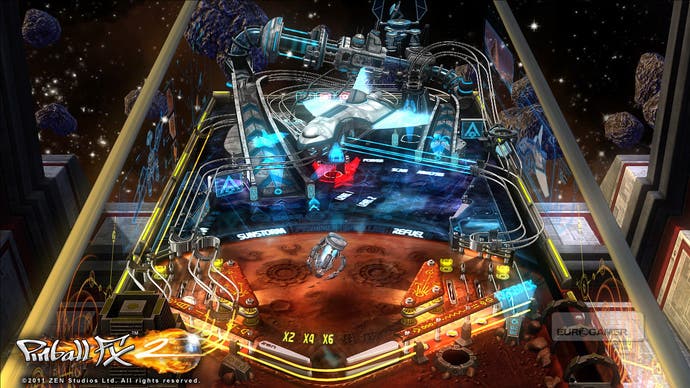
In the console world, a lot is going to depend on how Nintendo, Microsoft, and Sony manage the digital stores for their new consoles. We don't have any special insight into what's going on there, except that we expect the Wii U to be more amenable to digital sales than the Wii was.
There's also a winner-take-all battle to the death for the future of portable gaming going on. The 3DS and the Vita are the first gaming portables to be released since the iOS App Store launch started the inevitable path towards convergence. Will people pay a premium for real buttons and real games - as opposed to the Gameloft knockoffs - when they already have a smartphone in their pocket? The new platforms are certainly opportunities, but the risks are high.
Another new opportunity fraught with risk is the emergence of China as a legitimate market, particularly on the mobile side. They're moving from working for pennies to build iPhones to paying pennies to play games on them. Of course, piracy is rampant, the government is a patchwork of corrupt, nominally anti-capitalist fiefdoms, and partnering with companies requires you to navigate a Byzantine maze of regulations.
We're happy to be known for pinball, as it's a genre with proven staying power. In an unpredictable hit-driven business, sales but that are unspectacular but steady is a very welcome prospect, particularly in the here-today-gone-tomorrow realm of independent developers.
Diversification is the smart way to go. We did pretty well with Planet Minigolf in 2010, and we'll build on that sometime down the road. We've also got a bunch of ideas for new games that don't involve ball physics of any kind. Although we're not announcing dates or details yet, we'll be putting out two of them this year.
